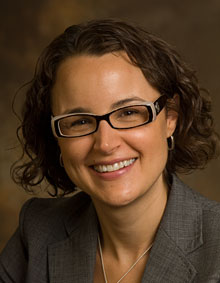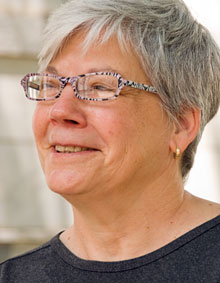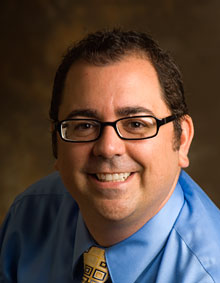Winter 2009: Online Exclusive

Ali Crown 85C, Center for Women at Emory
Ann Borden

Dona Yarbrough, Center for Women at Emory
Kay Hinton

Saralyn Chesnut 95PhD, LGBT Life
Bryan Meltz

Michael Shutt, LGBT Life
Kay Hinton
Passing the Torch
First directors of centers for women and LGBT community make way
By Paige P. Parvin 96G
The early 1990s saw the beginnings of two vibrant new resources on the University campus—the Center for Women at Emory (CWE) and the Office of Lesbian, Gay, Bisexual, and Transgender (LGBT) Life. Born of a marriage between community need and administrative foresight, these progressive initiatives have taken concrete shape as warm, lively centers of activity for women and LGBT students, faculty, and staff.
Some fifteen years later, Emory is experiencing the end of an epoch as the first directors of both offices retire.
Ali Crown 85C already had served in various roles (including student) at Emory for more than ten years when she was appointed director of the Center for Women at Emory, then called the Women’s Center, in 1991. A longtime women’s advocate, particularly in the arena of reproductive rights, Crown had been on the President’s Commission for the Status of Women since 1980. “Ever since I arrived on campus I’ve been rabble-rousing for women,” she told Emory Magazine in 2003.
Under Crown’s leadership, the center became a firmly established source of support, social networking, intellectual exchange, and inspiration for women across the University. Its offerings span a wide range, from the Nursing Nest, where mothers can find a cozy corner, to counseling services, professional advocacy, health information, support groups, referrals, and an extensive library.
Signature programs include the Mary Lynn Morgan Annual Lectureship on Women in the Health Professions; Telling Our Stories; the Unsung Heroine awards; financial seminars for women; a Women’s Health and Wellness lunch and learn series; and Conversations on Mid- and Late-Life Transitions.
“Because I am the first director,” Crown says, “it has been not just my responsibility, but my privilege, to set the tone and culture for the center.”
Last fall, that responsibility fell to Dona Yarbrough, who assumed directorship of the CWE in September. Yarbrough came to Emory from Tufts University, where she served as director of the Lesbian, Gay, Bisexual and Transgender Center and a lecturer in women’s studies. Prior to working at Tufts, she worked in the women’s center at the University of Virginia, where she also earned an MA and PhD in English.
Yarbrough was impressed with Emory from the start. “There are so many enormous things going on here that make it a very exciting place to be,” she told the CWE newsletter, Women’s News and Narratives, when she arrived.
Like the Center for Women, Emory’s Office of LGBT Life has grown from earnest roots into a flourishing center of programs, events, and services for LGBT community members. Saralyn Chesnut 94PhD, a doctoral candidate in the Institute for Liberal Arts at the time, joined in the catalytic 1992 march on the Quad when a group of students rallied to protest the administration’s handling of a gay harassment case. A few months later, she took leadership of the new office, one of the first of its kind in the South.
“When this job came along, it was the perfect combination of academia and activism,” Chesnut says. “It was a chance to make a difference here and also teach on a college campus.”
And make a difference it did. Within a year of Chesnut’s appointment, sexual orientation was added to Emory’s Equal Opportunity Policy (EOP); in 1995, she was instrumental in the University’s decision to offer domestic partner benefits to employees. Chesnut also helped create the annual Pride Banquet, the Gay and Lesbian Film Festival, the Safe Space program, and Emory’s participation in National Coming Out Day. More recently, she joined the President’s Commission on LGBT Concerns in successfully advocating for the EOP to be revised to protect transgender people.
“I’m just really happy to have had the opportunity to be a part of making change. And I think Emory will keep moving in the right direction,” says Chesnut, who will continue to teach American and Women’s Studies courses as adjunct assistant professor in the Graduate Institute of the Liberal Arts.
For the Office of LGBT Life, the right direction will be guided by Michael Shutt, assistant dean for Campus Life and the office’s new director. Shutt came to Emory from the University of Georgia, where he was director of the LGBT Resource Center from 2005 to 2008. As the founding director of the center, Shutt, much like Chesnut, helped guide UGA to a new nondiscrimination and anti-harassment policy, domestic partner benefits, and a Safe Space program for the LGBT community. Shutt earned his PhD from UGA in student affairs administration.
“I am excited to be at an institution of higher education with a relatively longstanding commitment to the lesbian, gay, bisexual, transgender, and queer (LGBTQ) communities,” Shutt says. “When the office opened, Emory joined nine other colleges and universities in providing support services for the LGBTQ communities and it was the first in the South. Today, Emory is listed among the top one hundred most inclusive universities in The Advocate College Guide for LGBT Students and has earned 4.5 of 5 stars in the LGBT-Friendly Campus Climate Index, a national benchmarking tool launched in 2008 by a nonprofit organization called Campus Pride. Being a leader in this work is exciting and challenging. It is exciting because there is obvious support for the work our office engages in on a daily basis, but a major challenge is not becoming complacent, as there is still much work to be done.”